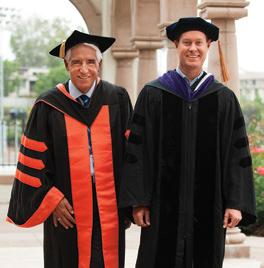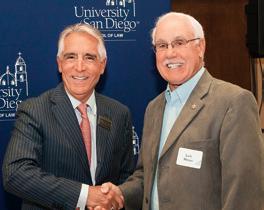
6 minute read
DeAn’s MessAge
Dean Stephen C. Ferruolo and Derek Aberle, ’96 (JD), at Commencement.
This issue of the Advocate includes many examples of people who have chosen to make a difference. They have done so in a variety of ways and in diverse roles; they also have enjoyed varying types of recognition and rewards. What they all share is their legal education. Law school inspired them to want to make a difference and gave them the skills they needed to make that difference. When someone asks me about the value proposition for a legal education, as they now often do, I cite stories like these and the compelling lesson I learn from them: There is no better way to prepare to make a real difference than by studying law.
The briefs and highlights about the notable achievements of our alumni who are litigators and jurists provide the most obvious, and expected, examples of how lawyers can make a difference in ways that truly affect people’s lives. These include the work done by Community Defenders to defend indigents accused of crimes; the class action suit involving the owners of Volkswagen diesel cars overseen by David Casey Jr., ’74 (JD), as a member of the National Steering Committee for that litigation; and the constitutional challenge to teacher employment laws for the discriminatory harm they do to disadvantaged students in the Vergara case led by Ted Boutrous Jr., ’87 (JD).
What many (especially critics of legal education) often fail to acknowledge is the broad compass of other fields in which law school graduates are also making a difference. Our 2016 commencement speaker, Derek Aberle, ’96 (JD), provides a notable example in the business and the technology sector. Hired initially by Qualcomm to draft and negotiate licensing contracts, Aberle is now capably guiding San Diego’s largest company, as well as one of the most innovative companies in the world, through the complex and evolving challenges of global competition. Another standout from the business world is Michael Lurie, ’93 (JD), who recently moved from a legal role to become senior vice president of brand strategy at Constellation Brands and now heads this global drinks company’s corporate team in Luxembourg. And although he has retired from Congress, the comprehensive tax reform proposal crafted by our 2016 Hughes Career Achievement Award winner, David Camp, ’78 (JD), while serving as chairman of the House Ways and Means Committee in 2014, remains central to the ongoing discussions of federal tax policy reform and analysis of the impact of taxes on our economy.
The Class Action section includes numerous other examples of the remarkable achievements of our alumni. As I have traveled and met alumni from all around the world, it has become evident to me that, because of the analytical and advocacy skills taught in law school, our graduates are able to be successful in a wider range of fields and endeavors than those with any other professional training. When I ask alumni about the value of their legal education, I frequently hear variations of what Derek Aberle told our graduates: “I still use the training I received at USD every day. Your education will not only help make you great lawyers, but also great businesspeople and future leaders who are making a real difference.”
This issue of the Advocate also demonstrates that making a difference typically begins while our students are still in law school. For a notable example, see the story about Natalia Nyczak, ’16 (JD), who, as a student, completed a sixmonth internship with the Supreme Court Chamber of the Extraordinary Chambers in the Courts of Cambodia, which is responsible for prosecuting war crimes and atrocities committed by the Khmer Rouge. Closer to home, on our campus, consider the great work being done by the students in our clinics, including the revamped Entrepreneurship Clinic and the Energy Law and Policy Clinic, both highlighted in this issue.
For many of our students, the inspiration to make a difference comes from our faculty. The five longtime law professors retiring in 2016, featured in the article “A Fond Farewell,” exemplify our faculty’s commitment to make a difference by
both what they teach in our classrooms and what they do in our community. Laura Berend’s, ’75 (JD), service to indigent criminal defendants, Paul Horton’s oversight of the judicial internship program, Jack Minan’s service on regional and state water and land conservancy boards, Terry Player’s advocacy for the poor and social justice, and Jorge Vargas’ work to build bridges of understanding across our common border with Mexico are examples of how our great law professors have inspired generations of students to make use of their legal educations to serve others.
Our cover story showcases the exemplary service provided to USD by Vice Dean Mary Jo Wiggins. During the past 10 years, Dean Wiggins has been the steady hand on the tiller guiding the law school through many changes and challenges, repeatedly demonstrating that making a real difference is often best done by those willing to make an unselfish commitment to the success of others. Dean Wiggins has been the epitome of a trusted adviser to me, as to many of our faculty colleagues. Her myriad achievements in enhancing our curriculum and improving both what and how we teach will have a positive impact on our graduates for decades to come.
The In Memoriam section records the loss of several notable alumni, three renowned professors emeriti, Carl Auerbach, Richard (Dick) Pugh and Lester Snyder, and a dear friend of our law school, Justice Antonin Scalia. Justice Scalia visited our law school five times while serving on the Supreme Court. He developed close personal friendships with several members of our faculty, helped launch our Center for the Study of Constitutional Originalism (CSCO), imbued many of our students with his deep love of the law, and shared this university’s commitment to the Roman Catholic faith and intellectual tradition.
During his first visit in February 2004, Justice Scalia spent a full day meeting with students and faculty, guest teaching classes and serving as the presiding judge for the final round of the Paul A. McLennon Sr. Honors Moot Court Competition. In August 2006, he returned for a week as Distinguished Juristin-Residence, giving lectures that drew crowds so large that a lottery system had to be used to allocate seats, including the inaugural lecture for the CSCO. Justice Scalia visited again as a Jurist-in-Residence in September 2007, co-teaching a class on the separation of powers with Professor Michael Ramsey. In September 2009, he returned for a two-day visit, guest teaching classes in constitutional law and oral advocacy and giving a public lecture on originalist approaches in recent Supreme Court decisions. His final visit was in September 2014, when he dropped by the law school and spent more than an hour taking questions on a broad range of subjects from an enthralled group of students in Professor Michael Devitt’s evidence class. However controversial he may have been, no one can doubt Justice Scalia’s leadership on the Supreme Court and his enduring legacy. As a final note, I want to acknowledge the difference our donors chose to make this year in so many ways, including by responding to the Big Give; supporting the continuation of the Dean’s Scholarship Initiative; and helping the law school to establish several new scholarships, including two awards for LGBT students and those supportive of LGBT issues. To continue to train lawyers who will make a real difference requires that we strive to make our law school more accessible and affordable, and, no less important, more welcoming to, and supportive of, a diverse and inclusive study body. A special thanks to our many generous alumni and friends who recognize, and who have so generously responded to, this challenge.

alan decker
Dean Ferruolo with Professor Jack Minan at the reception honoring the five professors who retired this year. Stephen C. Ferruolo Dean, USD School of Law





